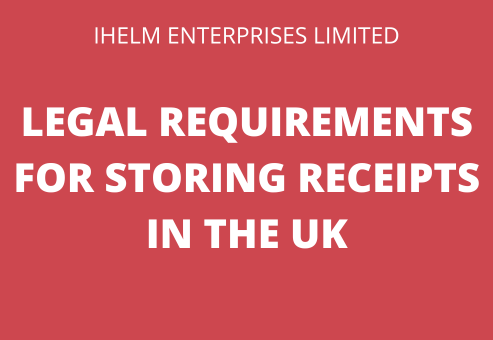During September’s Facebook Live, I talked briefly about the requirements businesses in the UK have concerning storing their business receipts and provided some suggestions on how they could do this.
Keeping accurate and organized business records is essential for any business, regardless of its structure. Proper record-keeping ensures that you can efficiently manage your finances, comply with legal requirements, and provide evidence in case of audits or disputes. In the UK, different business structures have specific guidelines and best practices for storing business receipts. We will cover the key aspects of receipt storage for sole traders, partnerships, limited companies, and other business structures in the UK.
What are the legal requirements?
All businesses within the UK must store the paperwork relating to their business transactions so that if HMRC ever inspects, they can prove what each transaction is for. They must store anything that relates to sales, income receipts, expenses, and purchase receipts. This information can be stored in either paper or digital format, as long as they are easily accessible and readable. If you do store them digitally, make sure they are backed up to prevent data loss. All documents should include the date, amount and the nature of the transaction. If your business is VAT registered, you need to ensure that you include all VAT receipts.
The length of time a business needs to store its records does depend on the type of business structure.
- Sole traders and Partnerships must store their records for at least 5 years after the January 31st submission deadline for the relevant tax year
- Limited Companies and Charities must store their records for at least 6 years from the end of the last company financial year they relate to
The records that are kept must be accurate, complete and updated regularly to reflect the true financial position of the business.
Failure to keep proper records can result in significant penalties. HMRC may charge fines or even conduct investigations if a business is found to be non-compliant. Therefore, maintaining accurate and comprehensive records is not just a legal obligation but also a safeguard against potential legal issues.
How can I store my records?
Back in the day when things were more paper-based, I would advise clients to have separate files for purchases and sales, as well as paid and unpaid. In today’s world, a lot of information can be stored digitally – whether this is invoices/receipts that have been sent by e-mail, downloaded from an online platform, or you’ve scanned/taken a photo of them. It makes it a lot easier to store the information, and share it with staff/bookkeeper/accountant, but also saves you space, paper, and ink.
Now, I advise clients to set up a digital file system to save documents in two different locations – your laptop and a cloud location. The cloud location could be a shared location with your bookkeeper or accountant. I use Bright Manager to manage my bookkeeping clients, and there is a document portal where I have clients upload everything I need to. You could also use Google Drive, One Drive, Dropbox, or another cloud-based storage system.
I advise that you use a folder structure where you have a main folder for the tax year, then inside folders for each month, and inside those folders at least a folder called “Finished With” where you store any files you have processed, even if it’s just sharing them with your bookkeeper or accountant. You can make the file system as simple or as complicated as you want – as long as you can find the information.
This is very relevant in terms of MTD for VAT, and MTD ITSA (when it comes into play). It is extremely important for any VAT-registered business. You need to be able to provide proof of each transaction – which HMRC could ask for.
A great thing about a lot of cloud-based accounts software is that you can attach files to a transaction in the software, meaning you have a third storage system and if HMRC want to see the proof for a transaction, you can just open it and show it straight away.
There are also several apps that can help with getting your purchase information into your cloud-based software, and these apps can also act as a storage system. They allow you to take pictures of receipts, upload them, or even e-mail them, and then once they are processed, that information is sent straight to your accounts software.
Now that the records businesses need to keep can be stored digitally, it makes it a lot easier. You don’t need to worry about physically storing all the pieces of paper and the space that takes up, or that the records will degrade over time.
If you want to keep physical records, it is important that you use a proper filing system, such as labelled folders or binders to organise all receipts by month or category. This method is traditional but it is effective for those who prefer physical copies. For added security, especially for essential documents, consider storing physical receipts in a fireproof safe.
Make sure you get into the habit of regularly scanning/uploading your receipts to avoid a backlog. Set aside time each week or month to ensure all receipts are accounted for and stored correctly. Ensure that if you have any staff involved in financial transactions they understand the importance of keeping accurate records and know the process for storing them.
By adhering to these legal requirements and employing effective storage solutions, businesses in the UK can ensure they are prepared for any financial scrutiny and maintain accurate financial records. This not only helps in legal compliance but also contributes to better financial management and decision-making.
If you have any questions about how you should be storing your business receipts, please feel free to e-mail me.

